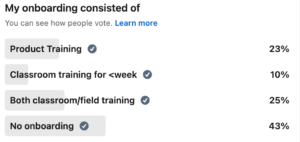- May 8, 2024
- Posted by: Dave Kurlan
- Category: Understanding the Sales Force

It’s been twenty-two years since I converted from Judaism to Catholicism and I found myself thinking back to the conversion. RCIA (The Rite of Christian Initiation of Adults) is a process that welcomes non-baptized adults into the Catholic Church. RCIA by any other name is onboarding and my Catholic onboarding took around a year.
Regular readers know that most of my life experiences pass through a sales filter, meaning that there is always an analogy to sales and while sales onboarding has many similarities to RCIA, there are many differences as well. Despite immersing myself in a one-year training program, I still don’t know the prayers that my wife and son can say by rote because they grew up reciting those prayers and I didn’t. Is that how new salespeople feel about things that come so easily to veteran salespeople?
Before we can discuss onboarding, it’s important to understand who enters the sales profession, when, and why. To help with this question, I polled followers on LinkedIn and these are the results:

As you can see, very few people purposely enter sales as a career. 10% weren’t qualified to do anything else (me) or didn’t receive other job offers. After establishing themselves as engineers, technicians, estimators, installers or professionals, 12% were later given an ultimatum of moving into sales or losing their job altogether – typically during recessions. At some point later in their careers, three quarters of the respondents voluntarily took a job in sales. From the comments it was obvious that many were envious of the perceived benefits that salespeople received including how well they dressed, their meals and expense accounts, the nice cars they drove, the travel, and especially, their earnings potential.
This video attempts to answer the question: Is a Sales Career in Your Future?
At the time, most people didn’t realize how difficult it would be to achieve success in sales.
My RCIA training was fairly comprehensive and took place in the classroom, in Church, at home and on retreats. I imagine that today, some of it could have been accomplished via self-directed online training to supplement the live discussions that were such an important part of the program.

When it comes to sales onboarding, nearly half were not onboarded and 23% more received no sales training relative to selling the company’s products/services. If you were one of those salespeople, it will come as no surprise. For the rest of us, especially those who invested in their careers, became students of selling, or who like me, entered the field of sales development, it’s malpractice practiced at scale by millions of companies! They believe that salespeople should just know what they’re supposed to do and figure it out. How hard can it be? Ha!
Onboarding isn’t the biggest reason why more than 50% of salespeople don’t meet their quotas each year, but it sure plays a part. There are eleven other reasons why more than half of all salespeople are failing:
- Sales Selection – Salespeople weren’t a good fit for the role, lacked the sales competencies and/or experience required for success, or their personalities weren’t conducive to building and maintaining strong relationships
- Coaching – Sales managers did not provide frequent, proactive, high quality, efficient coaching to their salespeople
- Direction – Sales managers did not provide guidance, support and direction that would support sales success
- Accountability – Sales managers did not hold their salespeople accountable for achievements, milestones, metrics, change or results
- Training – The company did not provide professional, outside sales training
- Sales Process – Most companies lack formal, staged, visual, structured, milestone-centric, buyer focused sales processes and without them salespeople wing it and employ seat-of-the-pants selling
- Lack of Discipline – Salespeople don’t do the things they don’t feel comfortable and/or don’t enjoy doing
- Lack of Consistency – Salespeople don’t do the important things every single day
- Lack of Motivation – Salespeople don’t have a good reason to persevere over rejection, lying competitors, difficult buyers, and unfavorable selling conditions
- Lack of Selling Skills – Salespeople have too many gaps in the ten tactical Selling Competencies, (10 attributes each for 150 unique selling skills).
- Poor Sales DNA – Salespeople have too many weaknesses in the six Sales DNA Sales Competencies that sabotage their ability to execute
Let us know if you need help in any of these ten areas.
The biggest difference between my onboarding through RCIA and sales onboarding is that everyone who wishes to become Catholic must complete RCIA while similar programs for selling are still very much at the discretion of the company and its sales leader.
While it does matter if you were not properly onboarded, it was in the past, you are reading to improve and/or hone your skills, and every little bit helps!
It’s time that all companies provide proper onboarding to their new salespeople. Read these two articles about onboarding new salespeople!
Onboarding can be formal or informal, short or long, in the classroom, self-directed, blended, or in the field, comprehensive or simple, graded or ungraded, supervised or unsupervised, provided by you and/or others, and have a single track or multiple tracks. But what isn’t optional is onboarding itself.
Let us know if you need help.
Image copyright 123RF
